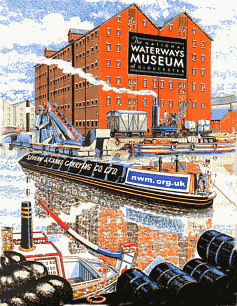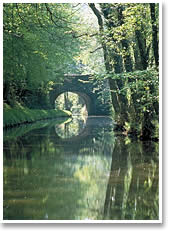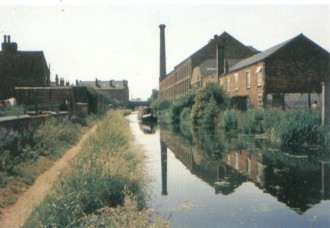|
A Place To Begin

|
| The National Waterways Museum, Gloucester, UK |
History tells us that although there were a few earlier canals, the Duke of Bridgewater's canal from his mines at
Worsley to Manchester, engineered by perhaps the greatest of canal engineers, James Brindley, was the beginning of the canal
age. This cut was completed in 1761, and the canal age lasted until 1838 when the London to Birmingham railway was opened
bringing along stiff railway competition to the waterways network. During the intervening years, over 300 Acts of Parliament
were passed authorising the building of a variety of canals throughout the United Kingdom. Brindley became involved in many
of these projects and he dreamed of constructing a 'grand cross' of canals connecting England's four major rivers, the Severn,
Trent, Mersey and Thames. This finally came about but not until many years after his death.
Among the great canal engineers alongside James Brindley were William Jessop and Thomas Telford.
He had a share in
Golden Hill colliery and was a partner of his brother John in the Longport Pottery. His brother John brought land in the vicinity
of the proposed canal at advantageous terms and in 1773 (before the canal was opened) built two factories at Longport. James
Brindley married Anne Henshall on 8 December 1765 at Wolstanton church, and had two daughters, Susannah and Anne. He also
had a natural son, John Bennett (1760-99), from whom Arnold Bennett the novelist descended.
In all, he was responsible
for a network of canals totaling about 360 miles (580 km). The improvement in communications helped to hasten the Industrial
Revolution. Brindley, a self-made engineer, undertook all his works without written calculations or drawings, leaving no records
except the works themselves.
He died at Turnhurst on 27 September 1772 and was buried in the churchyard at Newchapel

|
 |
|
 |
 |
|

|
| Long Eaton.Three canals served the Nottingham coalfields only the Erewash remains navigable |
|
|
A very large selection of photographs
featuring the inland waterways
of Great Britain
two and a half years on the
canals of England and Wales
with Roger and Maureen Yorke
waterways photographer
The Manchester, Bolton and Bury Canal
The Wendover Arm Trust is a charity
dedicated to restoring the Wendover Arm
of the Grand Union Canal which runs from
the Tring Summit at Bulbourne
London's Lost Route to the Sea
Birmingham & Black Country Canals
Past & Present
about the River Thames, and the places
and people on its banks.
to be found on our
The Prospect Before Us website
the Industrial Revolution, Staffordshire
was at the heart of the action. There
are more miles of canals within its
boundaries than any other county in England
the page about the canals of England
on our The Prospect Before Us website
that was the beginnings of this website
|
|
 |
 |
some pictures(where noted) are
to whom massive thanks go out.
|
 |
|
|
 |
|
|
|

